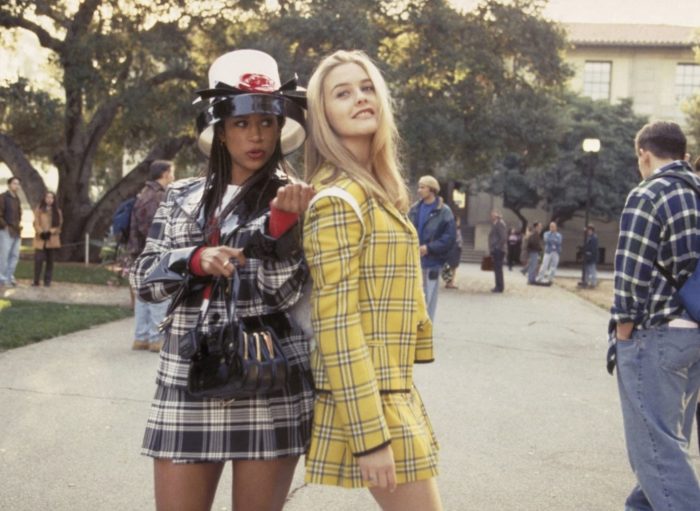My most embarrassing school memory wasn’t the time I peed my Bluebird tights in first grade.
It wasn’t when I slipped in the high school hallway and grabbed onto the long, lush mane of the girl in front of me in a desperate attempt to steady myself.
No, my most embarrassing moment happened in Mrs. Price’s high school philosophy class, and almost 30 years later, I can still feel the shame steaming up my neck.
We’d been talking about socioeconomic classes.
“So there’s the lower middle class sitting above lower class,” the teacher said, pointing to a crooked white pyramid on her chalkboard. I glanced up at the triangle, then returned to doodling little spirals on the margins of my notebook.
“And then we get to the middle class. There’s lower middle class, middle class, and upper middle class. And, we only have one upper middle class family in our town—and that’s Lynn’s family,” she said, pointing at me.
My classmates whipped around in their desks so quickly, I could almost hear the sound of their torsos cutting through the air. With all eyes on me, I gaped at my teacher for a split second, then back down at the swirls of ink on my paper.
“Hey, Lynn, will you marry me?” the boy sitting in front of me cracked. Giggles erupted, slicing through the tension, but also magnifying the hot twist of feelings brewing inside me.
As an introverted and insecure adolescent, I loathed being the center of attention. Mrs. Price’s loaded proclamation had placed me firmly in the hot seat.
Secondly, part of the teacher’s proclamation was untrue. I hadn’t known it at the time, but my family was indeed solidly upper-middle class. But I was pretty sure we weren’t the only family in our small town with that status. And even if we had been, how did Mrs. Price know that? Had she perused the bank statements of our entire town of 35,000 people? And how could she single me out like that? Would she have done the same thing if she thought my family was the poorest family in town?
For the rest of the day, I walked around resenting the teacher. She had a reputation for being outrageous—she’d sometimes plop down on the lap of a male student, and she had barked at me for chewing gum in class in a tone that suggested a much more serious infraction. But underneath my anger, a wide pool of shame and discomfort waited.
I hadn’t done anything to have the privilege that money brings. And, until that moment, I hadn’t even realized my family’s financial situation might be vastly different than my peers’. I hadn’t thought about the fact that I wouldn’t have to work my way through college or give my parents the money I made from my after-school job to offset the cost of groceries. I didn’t know what it was like to not be able to afford new tennis shoes.
Clearly, I didn’t know anything.
Those few minutes of high school planted a seed of shame in me that I’m still trying, nearly 30 years later, to shake. In that moment, my worldview about money and myself tilted. Having money set me apart from others, at a time in my life when I most wanted to fly under the radar.
Money and shame, for many of us, are deeply entwined. Some of us have loads of debt or low incomes. Or we earn high incomes, but we’ve ratcheted up our lifestyles to meet our incomes and are still living paycheck to paycheck. We inherited money that we did nothing to deserve, or we worked hard for every dollar that’s ever passed through our hands.
We don’t talk about money enough. Maybe it’s still a taboo topic because of the ever-stretching income equality, or because our families taught us it wasn’t polite to talk about it, or because in more mindful and spiritual communities, the pursuit of financial abundance is sometimes considered to be selling out or unholy. In silence, the shame tends to linger.
But money isn’t good or bad, spiritual or toxic. It’s a tool, and one that, if we seek mastery of it, requires tending to our wounds and stripping away our unhealthy stories.
In that moment in high school, I absorbed a host of unpleasant money stories: money set me apart, I was spoiled, I was undeserving. Even my classmate’s joke proposal contributed to the stories: having money was a big enough deal that people might be interested in me only because of it.
These stories have played out in my life in deep feelings of guilt and unworthiness, years of underearning and embarrassment for any financial blessings I’ve experienced along the way.
By being open and vulnerable about our life experiences, we begin to shape away the shame, which allows us to change our stories. For years I felt that was true when it came to topics like mental illness, parenting, and addiction—but not money.
Money was too personal, too uncomfortable, too polarizing to talk about. I’m ready to start talking about it. Are you?
What are your money stories or money memories?







Read 21 comments and reply